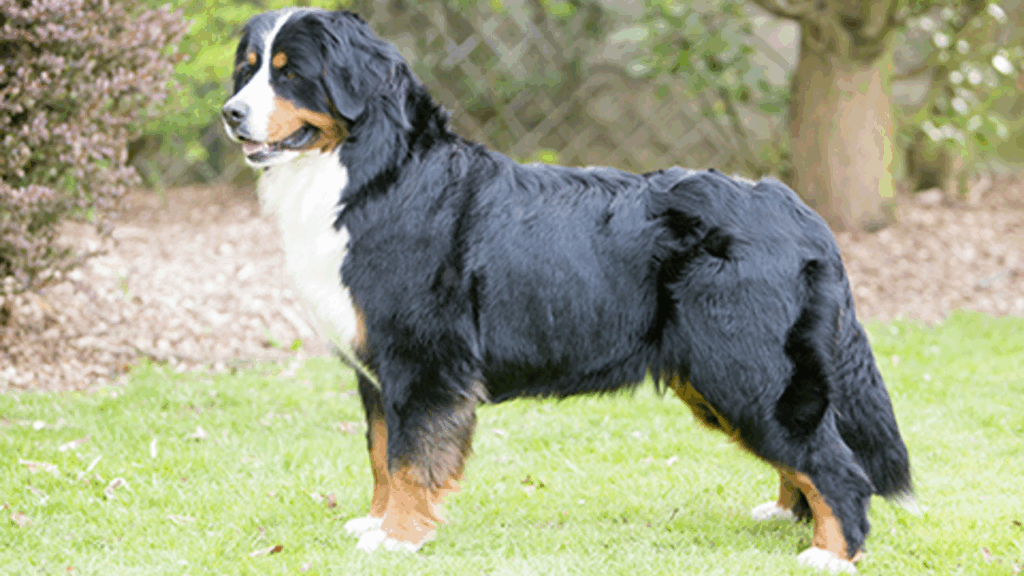The Bernese Mountain Dog is one of the most beloved large-breed dogs in the world. With its striking tricolor coat, calm temperament, and natural work ethic, the Bernese (pronounced BURR-neez) has earned a reputation as both a dependable worker and a devoted family companion. Originally bred for farm life in the Swiss Alps, today’s Berners are just as happy pulling carts and herding cattle as they are lounging by the fireplace with their human family.
Origins and History
The Bernese Mountain Dog hails from the canton of Bern in Switzerland, where it was developed as a working farm dog. Part of a group of dogs known as the Sennenhunds, the Bernese was used to pull carts, drive livestock, and protect property. Its sturdy build, thick coat, and gentle disposition made it ideal for life in the mountainous regions of the Swiss countryside.
The breed nearly vanished during the industrial revolution but was revived in the early 1900s thanks to the efforts of Swiss breeders. By the mid-20th century, the Bernese Mountain Dog had gained popularity across Europe and eventually in North America, where it continues to win hearts for both its appearance and temperament.
Appearance
The Bernese Mountain Dog is instantly recognizable due to its luxurious, tricolor coat, which consists of a jet-black base with rich rust and crisp white markings.
Breed characteristics:
- Height: 23–27.5 inches (males are typically larger)
- Weight: 70–115 pounds
- Coat: Thick, long, and slightly wavy or straight
- Color: Always tricolor—black with rust-colored markings on the cheeks, legs, and chest, and white on the chest, muzzle, and blaze
- Eyes: Dark brown and expressive
- Build: Sturdy and muscular, yet elegant
Despite their size, Bernese Mountain Dogs are graceful in movement, with a calm and confident demeanor.
Temperament and Personality
Bernese Mountain Dogs are known for their gentle and affectionate nature. They are devoted to their families and are particularly patient and sweet with children, making them excellent family pets.
Key personality traits:
- Loyal: Form strong bonds with their people and thrive on companionship
- Gentle: Calm and kind, rarely aggressive
- Eager to please: Generally obedient and responsive to training
- Alert but not aggressive: Make good watchdogs without being overly protective
- Sensitive: Respond best to gentle guidance and affection
These dogs are happiest when they are part of the family and included in daily activities. They may be reserved around strangers at first but warm up quickly with proper introductions.
Training and Intelligence
The Bernese Mountain Dog is an intelligent breed that enjoys learning, especially when training is approached with patience and positivity.
Training tips:
- Use positive reinforcement, such as treats and praise
- Start training and socialization early, especially due to their size
- Be consistent but gentle—harsh training can harm their sensitive nature
- Introduce them to a variety of people, places, and situations
They can be trained for various tasks, from basic obedience to pulling carts, therapy work, and even agility, although they may move at a more leisurely pace compared to other working breeds.
Exercise and Activity
Despite their calm indoor presence, Berners need moderate daily exercise to stay healthy and content.
Activity needs:
- Daily walks or hikes
- Outdoor playtime in a secure area
- Cart pulling or light work—activities they were bred for
- Mental enrichment, such as puzzle toys or obedience training
Due to their heavy coats, Bernese Mountain Dogs are not suited for hot climates and should be exercised during cooler parts of the day in warmer regions.
Grooming and Care
That gorgeous coat comes with some grooming responsibilities. Berners are moderate to heavy shedders, especially during seasonal changes.
Grooming essentials:
- Brush several times a week to prevent mats and manage shedding
- Bathe as needed, typically every couple of months
- Regular nail trimming, ear cleaning, and dental care
They are relatively clean dogs, but their thick fur can pick up dirt and debris easily, especially after outdoor play.
Health and Lifespan
While generally healthy, Bernese Mountain Dogs are known for having a shorter lifespan than many breeds, averaging 7 to 10 years.
Common health concerns include:
- Hip and elbow dysplasia
- Cancer (especially histiocytic sarcoma)
- Progressive retinal atrophy (PRA)
- Bloat (gastric torsion)
- Degenerative myelopathy
Responsible breeding and regular vet checkups can help detect and manage health issues early.
Is the Bernese Mountain Dog Right for You?
The Bernese Mountain Dog is ideal for:
- Families seeking a loving and loyal companion
- Individuals with space (they’re not great apartment dogs)
- Those who enjoy outdoor activities
- Owners willing to commit to grooming and health care
- People who value calm, patient, and intelligent dogs
They may not be ideal for hot climates or households looking for a highly active breed, but for the right family, a Berner is a joyful, affectionate addition.
Final Thoughts
The Bernese Mountain Dog is a perfect blend of beauty, brains, and heart. Their kind spirit, working dog roots, and devotion to family make them one of the most rewarding companions. While they may require a bit more care and attention than other breeds, the love and loyalty they give in return make every moment worthwhile.
If you’re ready for a life with a gentle giant by your side, the Bernese Mountain Dog may just be your perfect match.

Andy Parker is a dog lover, writer, and senior editor at BarkPicks. With years of experience covering canine health, training, and gear, he helps pet parents make smarter choices for happier, healthier dogs. Andy shares his home (and heart) with two rescue pups, Charlie and Mia.



